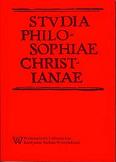Sceptycyzm i dyskusja z nim w filozofii George’a Berkeleya i Thomasa Reida
Scepticism and its refutation in George Berkeley’s and Thomas Reid’s philosophies
Author(s): Dariusz KucharskiSubject(s): Philosophy
Published by: Wydawnictwo Naukowe Uniwersytetu Kardynała Stefana Wyszyńskiego w Warszawie
Keywords: representationism; scepticism; presentationalism; common sense; immaterialism; Berkeley George; Reid Thomas
Summary/Abstract: The main aim of the paper is an attempt to characterize two different approaches to refute skepticism, namely, that of George Berkeley and Thomas Reid. The reason to choose these thinkers is twofold. First, the Berkeley’s system (among other systems labeled by Reid as ‘theory of ideas’) was an object of a very serious and even fierce critique by T. Reid. That critique was meant as a first step for creating his own system known as the Scottish School of Common Sense. Second, despite of that critique, in many respects the philosophical views of Reid strikingly resemble these of Berkeley. And among the resemblances, the opinions of the two about the nature of perception of external objects play a very important role. Both philosophers take presentationalism as their own position. Both of them maintain that the other possible view, representationalism, leads inevitably to skepticism. And, last but not least, one should remember that for G. Berkeley and equally T. Reid the refutation of skepticism was one of the most important reasons for building their own systems. However, the similarities mentioned above prove to be rather superficial. It is common knowledge how much differ the outcomes of the attempts taken by Berkeley and Reid to refute skepticism. So similar assumptions and goals do not bring similar answers at all. The paper attempts to show how Berkeley and Reid dealt with the problem of skepticism. Namely, what they meant by skepticism, how they understood an object of perception, and how they defined the reality of an object. And what solution against skepticism they offered. As we know Berkeley came to the conclusion that immaterialism is the best remedy against skeptical doubts about perceiving the real world. The concept of material substance and the mediate perception of things were the main sources of skepticism. Reid, however, defended the material nature of objects of perception – that belief was an intrinsic part of common sense. He maintained that any discussion with that sort of beliefs is impossible, they lay the foundations of any other knowledge. Consequently Reid builds such a philosophical system that would justify and prove right the beliefs of common sense.
Journal: Studia Philosophiae Christianae
- Issue Year: 46/2010
- Issue No: 2
- Page Range: 25-47
- Page Count: 23
- Language: Polish

